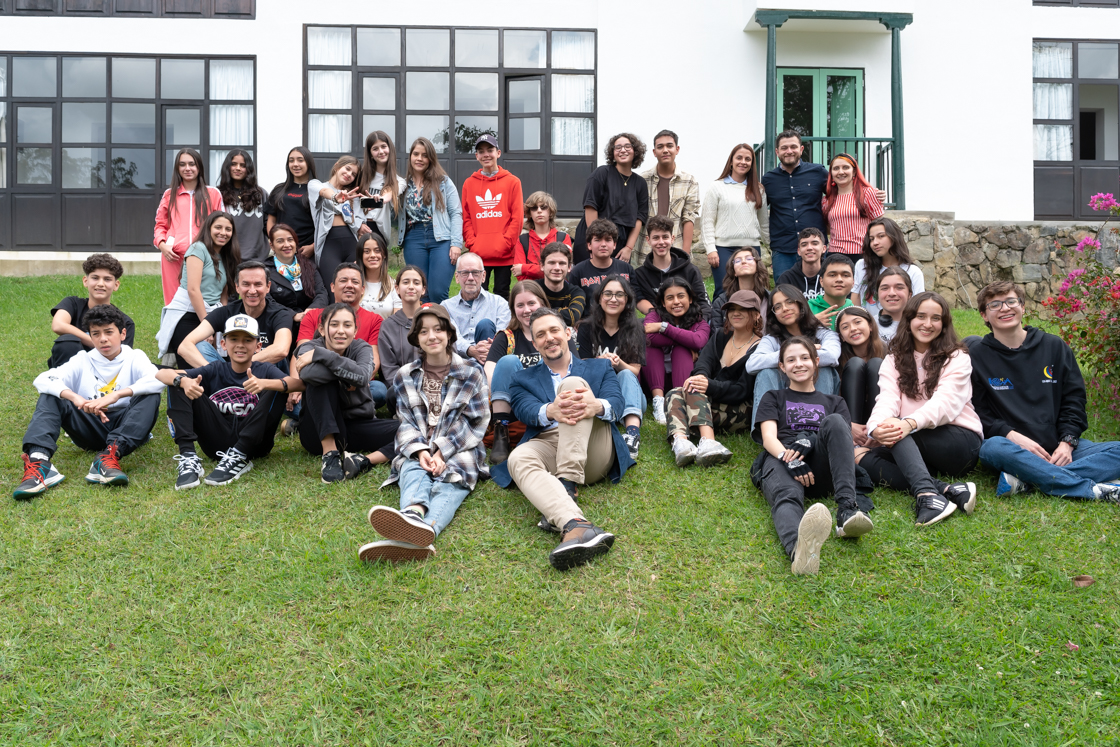Sederberg leads Purdue Science students in opportunities for learning and service in Colombia

07-18-2023
While other students were visiting beaches or popular night spots, several Purdue College of Science students spent their spring break accompanied by Dr. David Sederberg for a service project in Medellín, Colombia where they engaged 35 students from three different schools in lessons in astronomy, astrophysics, and related topics in AstroCamp 2023.
Recently awarded a Staff Engagement Award for collaborating in sustained synergistic partnerships with his community, Sederberg has led the K-12 Outreach efforts of the Purdue Department of Physics and Astronomy for more than a decade. His mission is to create and enhance science enrichment opportunities for K-12 students and their teachers in central Indiana and beyond, with the trip to Colombia representing the most recent study abroad experience through his program.
In the months of preparation prior to traveling to Colombia to host the program, the Purdue students learned principles of instructional design, pedagogy and assessment as part of their commitment to the Physics and Astronomy Service Learning course in which they enrolled.
“They worked together as a finely oiled machine,” Sederberg commented. “Writing, testing, revising, and, in some cases, going back to the drawing board and redesigning their lessons and experiments with predetermined learning goals and cultural objectives for our middle and high school audience.”
An essential part of the instructional design process is learning about target audiences. As the study abroad students began designing their experiments and lessons, they initiated frequent Zoom calls with their Colombian colleagues, in addition to email exchanges, recording explanatory videos and learning about the availability of materials and common items, which might be taken for granted in the U.S., but less common in Colombia.
“AstroCamp 2023 in Colombia was a unique and amazing experience,” says Alan Wright, first year grad student in Physics Education. “As an aspiring educator, I loved having the opportunity to work with the students from Medellín and both share my interest in astronomy and learn about their way of education.”
Even with all that preparation, there were still bound to be some surprises, but in AstroCamp 2023 those surprises were often pleasant inspiring ones. One example involved a design experiment in which students were given the charge of creating a physical planetary surface which they would in turn use sonar detectors to create a three-dimensional model. Students dove right in, exceeding all expectations.
Danielle Dickinson, third year grad student studying astrophysics, explained, “In the practice runs of this activity at Purdue prior to the trip, we set up simple box configurations in a grid pattern on the floor. In Colombia, students cut up the boxes, placed fabric over openings, and used additional materials. They created mountain ranges, craters, lakes, and other features that more accurately represent a planetary surface. Not only was the strategy more engaging for students, but the model also extended far beyond what we rehearsed with. The students’ resulting terrains facilitated a study of how the instrumentation could handle subtle changes in elevation, different geometries, and tested the resolution of the sensor, all of which are important diagnostics in developing the instruments used for mapping Mars.”
An important aspect of the study abroad experience is for potential student travelers to stop, stand back, think and contemplate ways in which cultures and traditions have values that are often different from their own. That means thinking about what to say (and when not to say something), what to wear, ways to move, how to talk, and ways in which travelers might come across as inappropriate and how we could be perceived by others. The key is to be respectful and appreciate the people, surroundings, and culture that study abroad students can witness in their travels.
“Leaving Medellín, Colombia, I was completely amazed by this new world I was able to live in for a few days, and I will always be grateful for that,” says Mariana Aguilar, undergrad senior in Planetary Science. “I greatly appreciate all the teachers that participated in the activities and I’m also thankful for the curiosity and passion present in each student. In the future, I hope to be able to return and continue growing the relationship between Colombia and Purdue. The trip inspires me to push myself outside of my comfort zone and take advantage of all opportunities to travel and teach young students.”
The primary goals of Service Learning Study Abroad for students are to:
- Apply grade level and culturally appropriate pedagogical strategies and science content knowledge to create and present STEM lessons to students of another culture.
- Demonstrate intercultural knowledge and effectiveness to successfully communicate, understand, and interact among people with ethnic and cultural differences.
- Demonstrate and evaluate personal growth in cultural worldview and self-awareness to confidently address challenges in a particular situation.
The Physics and Astronomy Service Learning and Study Abroad experiences are open to all majors. The service learning courses (PHYS 295 and PHYS 595) are offered every semester and are occasionally related to study abroad experiences. Interested students may enroll for 1-3 credits and participate in any of the outreach events available that semester. Both courses are repeatable for credit.
Learn more about Physics and Astronomy K-12 Outreach.
Learn more about K-12 Outreach for the Purdue University College of Science.